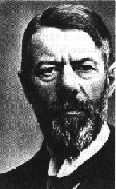

Max Weber Notes, Part 2
I. Rationalization
A. Rise of the “specific and peculiar rationality” dominant in Western, industrial societies
B. (Ideal) Types of Rationality
1. Practical
2. Theoretical
3. Formal
4. Substantive
C. Formal Rationality (focused on and guided by)
1. Calculability (the ability to quantify and measure action and outcomes)
2. Efficiency (most effective means to a given end [note parallels with means-ends action)
3. Predictability (ability to know actions and outcomes in advance [enhances calculability and efficiency])
4. Nonhuman technologies (replacing humans; enhances 1 through 3)
5. Maximum control
D. Substantive Rationality
1. Also an emphasis (like formal rationality) on methodical conduct of life
2. But the end/purpose oriented by larger set of (primarily religious) values
3. The larger value orientations are missing in formal rationality
II. The Protestant Ethic & the Spirit of Capitalism
A. “Standing Marx on his head”
1. Weber: the cultural origins of capitalism
a. idealism vs. materialism
B. Calvinism & predestination
1. anxiety about fate
2. searching for signs
C. Asceticism: signs of salvation
1. hard-working, self-denying (Poor Richard)
2. working in service to God
D. constantly calculating (hours worked; gains in prosperity)
1. n.b. – substantive à formal rationality
E. Over time, the habits of mind and thought remained, the religious justification for them diminished
F. The “specific and peculiar rationality” that made it possible for capitalism to emerge and flourish
III. “Ideal-Typical” Bureaucracy (A main institutional “carrier” of culture: specifically, formal rationality)
A. Work divided into specialized tasks (“offices”)
1. power in office, not person
B. Hierarchy of command
1. jurisdiction; power flows downward
C. Officials — > “career” (path through org’s)
1. path controlled by “universalistic” criteria
a) Merit, testing (demonstrated competence)
D. Work documented, stored in “files”
E. Exhaustive system of rules
1. salary, promotion, grievance, dismissal
F. All work is to be impersonal
All designed to ensure routinization and predictability: Rationalization of work & behavior
G. The state is one cultural carrier of rational-legal, bureaucratic authority
a. “that institution in society that has a monopoly over the legitimate use of violence”
Weber believed that formal rationalization would extend to all spheres of life, over time. The capitalist and the bureaucrat are the main carriers of formal rationality. Rationalization, in turn, would lead to the disenchantment of the world.